A Character Reference Letter for Court is an official document used to demonstrate and provide insight into an accused person’s or defendant’s good morals, values, and qualities to a judge or the court.
It is written by an individual who knows the accused well, such as a family member, friend, coworker, employer, religious leader, etc. A writer of the letter is known as a ‘referee.’ The letter can be used by lawyers or defendants in child custody cases, drunk driving (DUI) hearings, or any other case in which the court requires hearings about an accused person’s personality, reputation, or social standing. The information provided in the letter can help sway the case’s verdict in the accused’s favor.
This letter helps the judge or jury determine who the accused person is. It helps a lawyer create a compelling defense for the accused by enabling the referee to direct the court’s view to the kind of person the defendant is. These help influence the ultimate sentence handed down in the case, be it civil or criminal.
The referee of the letter should present the defendant or accused in a positive light. He/she should have a good reputation in the eyes of the community for the letter to have an impact on the decision made by the court. The referee should have some knowledge of the relationship shared between the plaintiff and the defendant to ensure that he/she can provide informed statements. He/she should also show and demonstrate the value a defendant has to society.
Sample Reference Letters
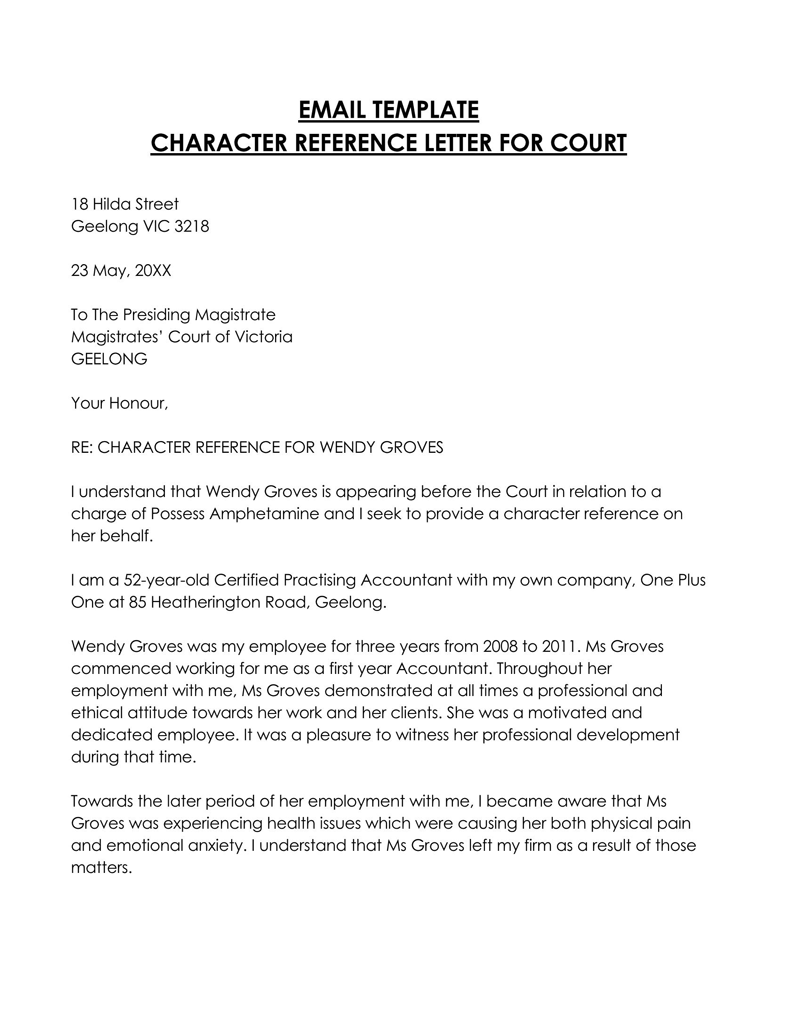
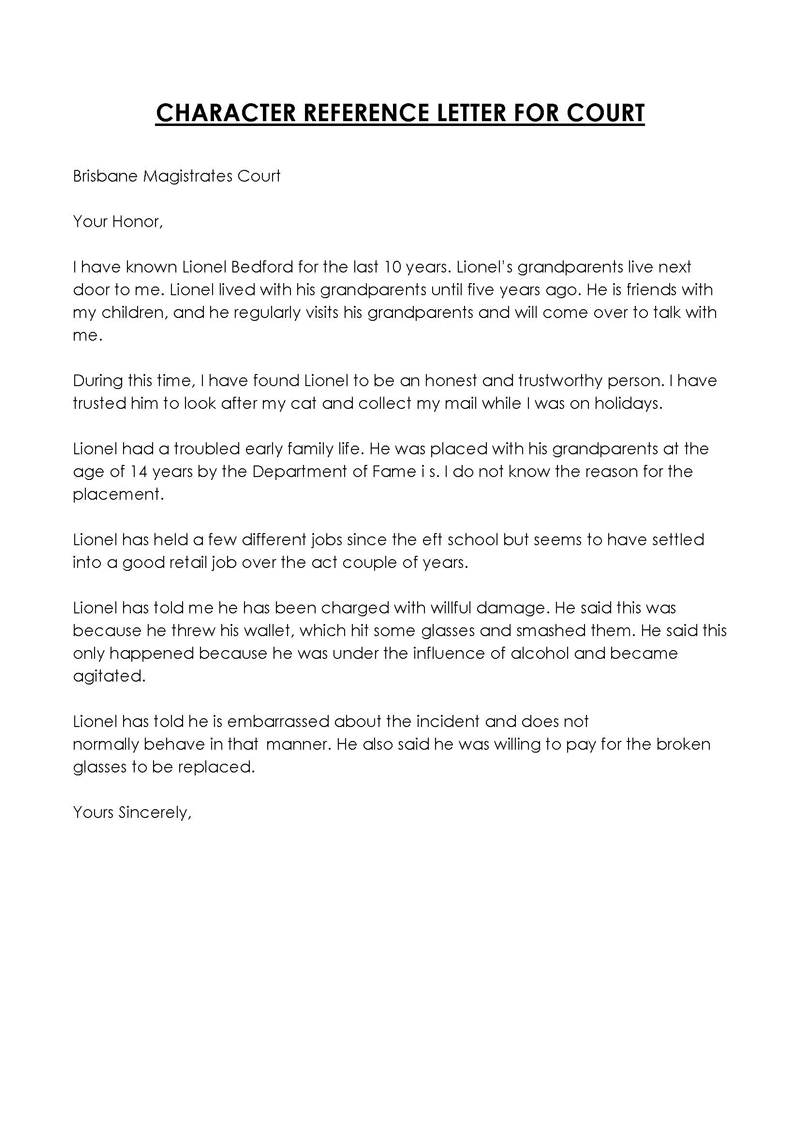
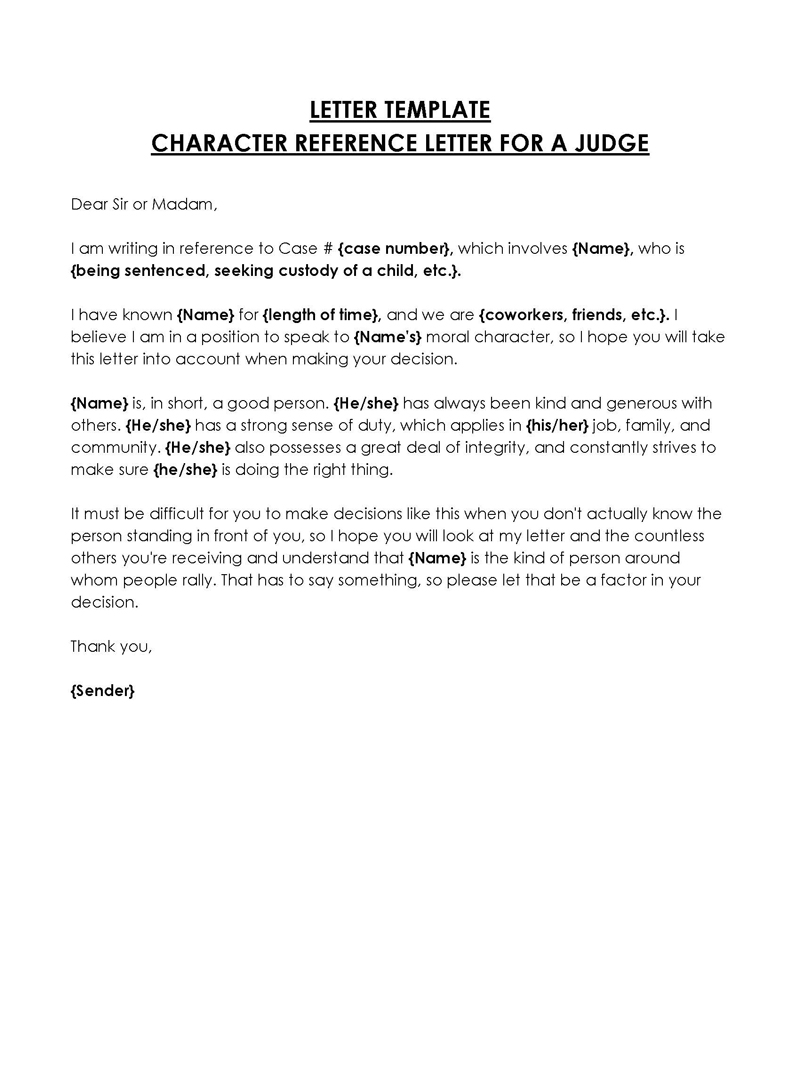
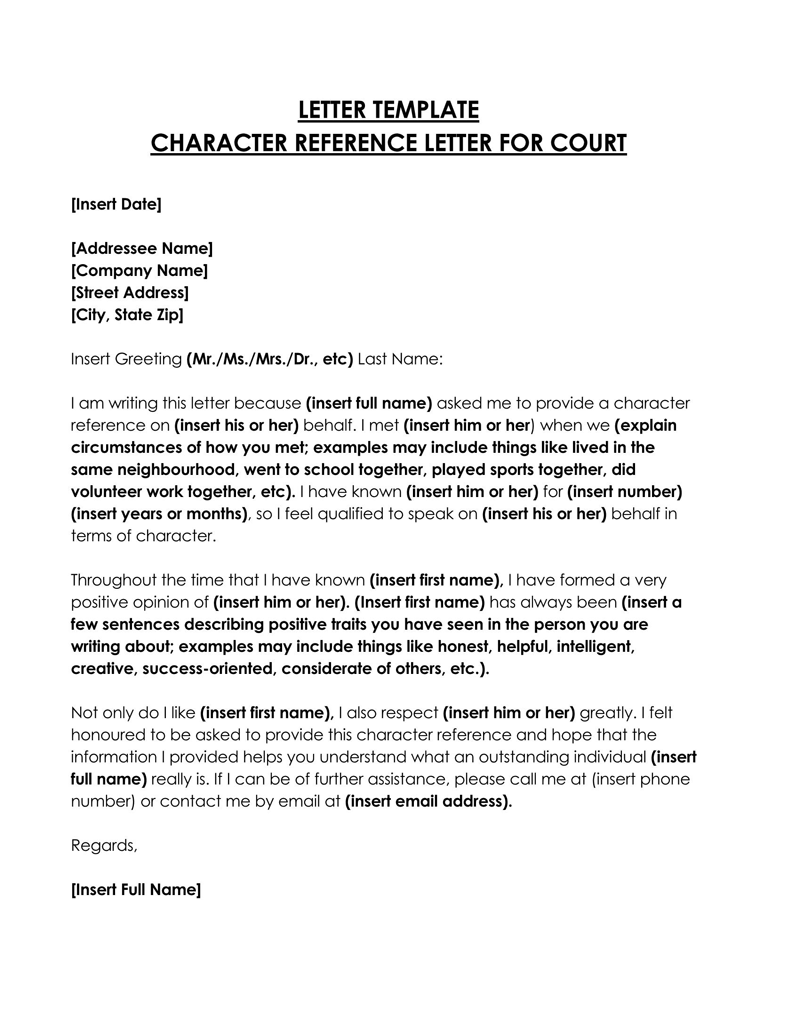
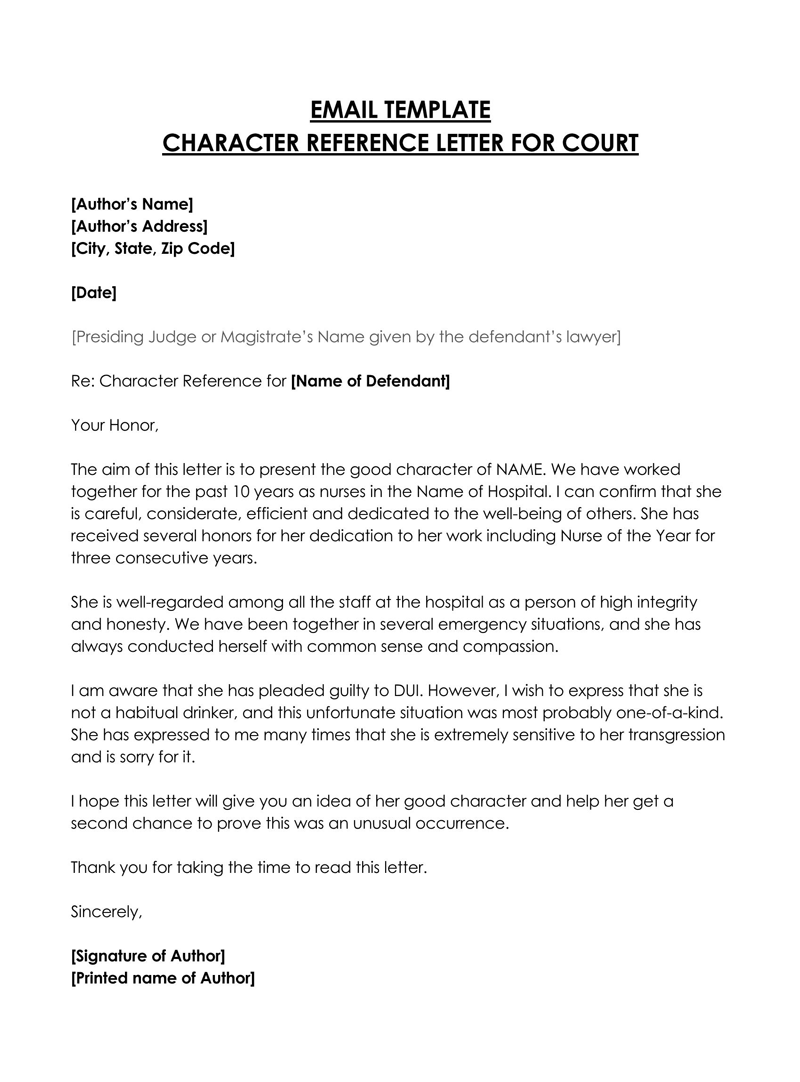
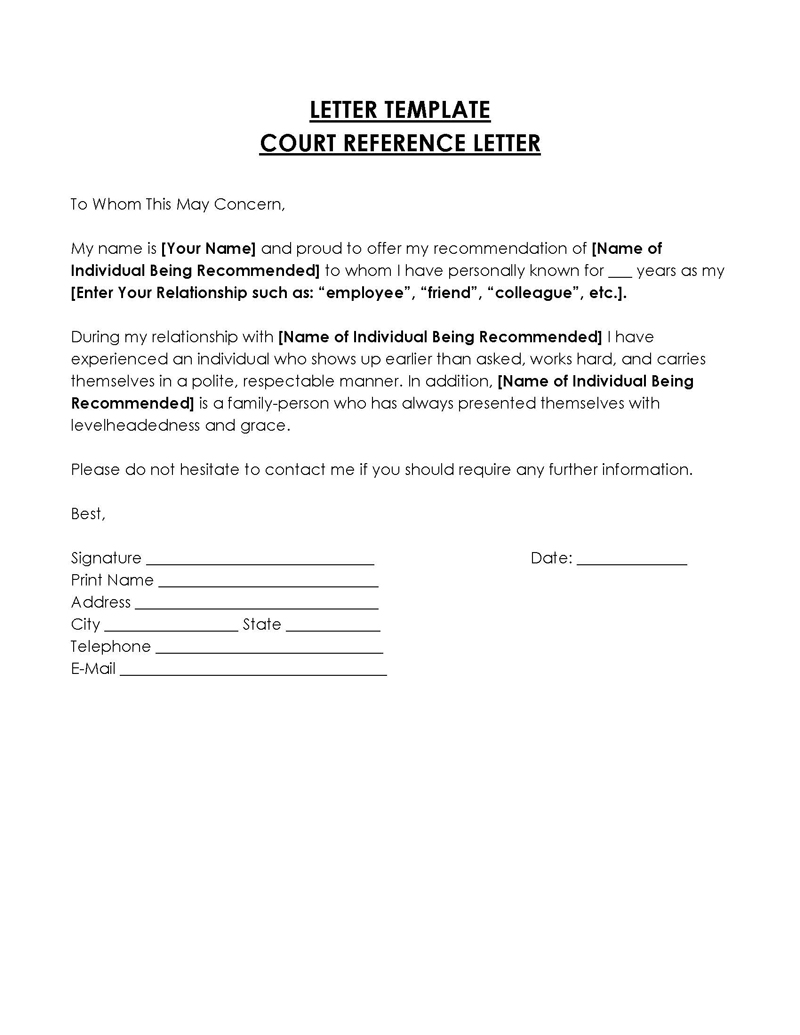
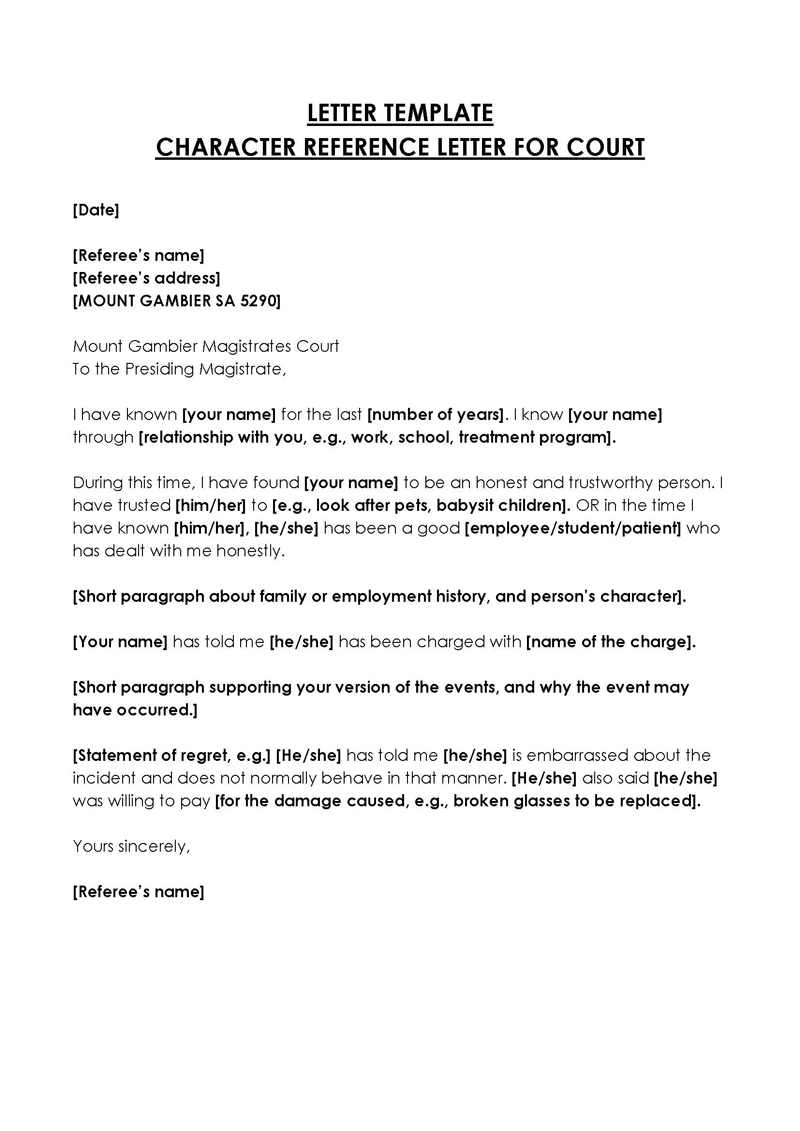
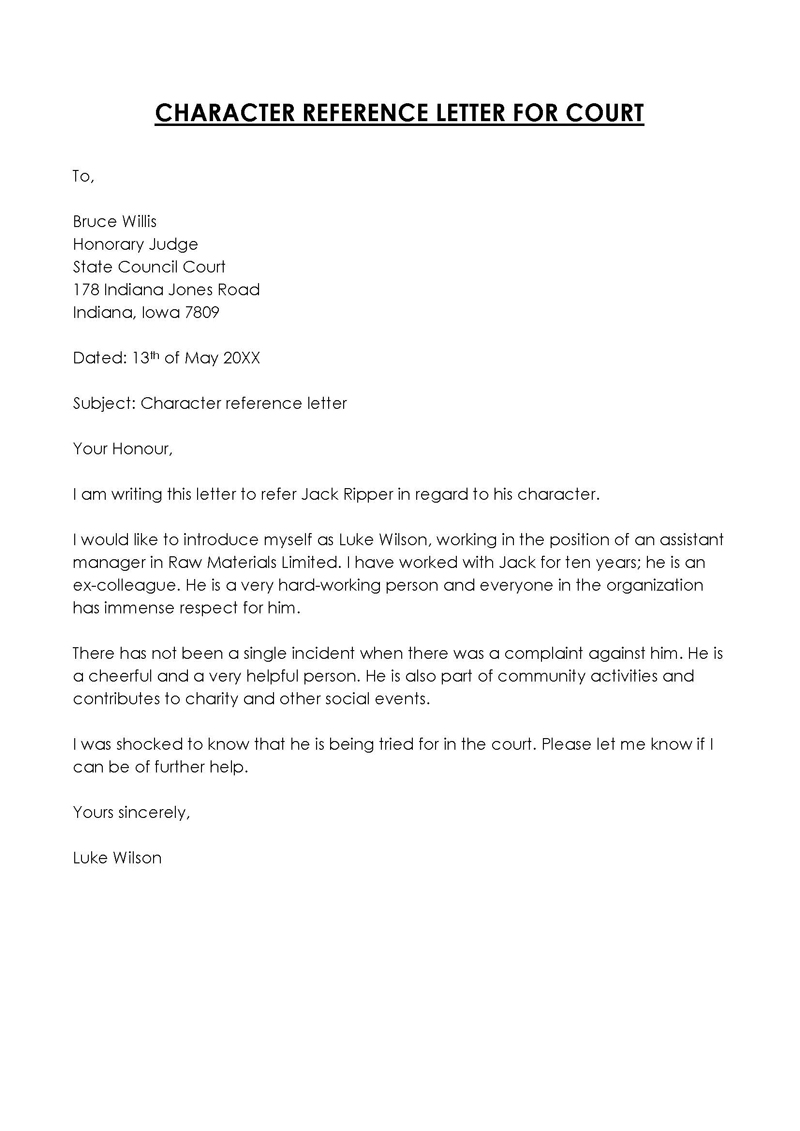
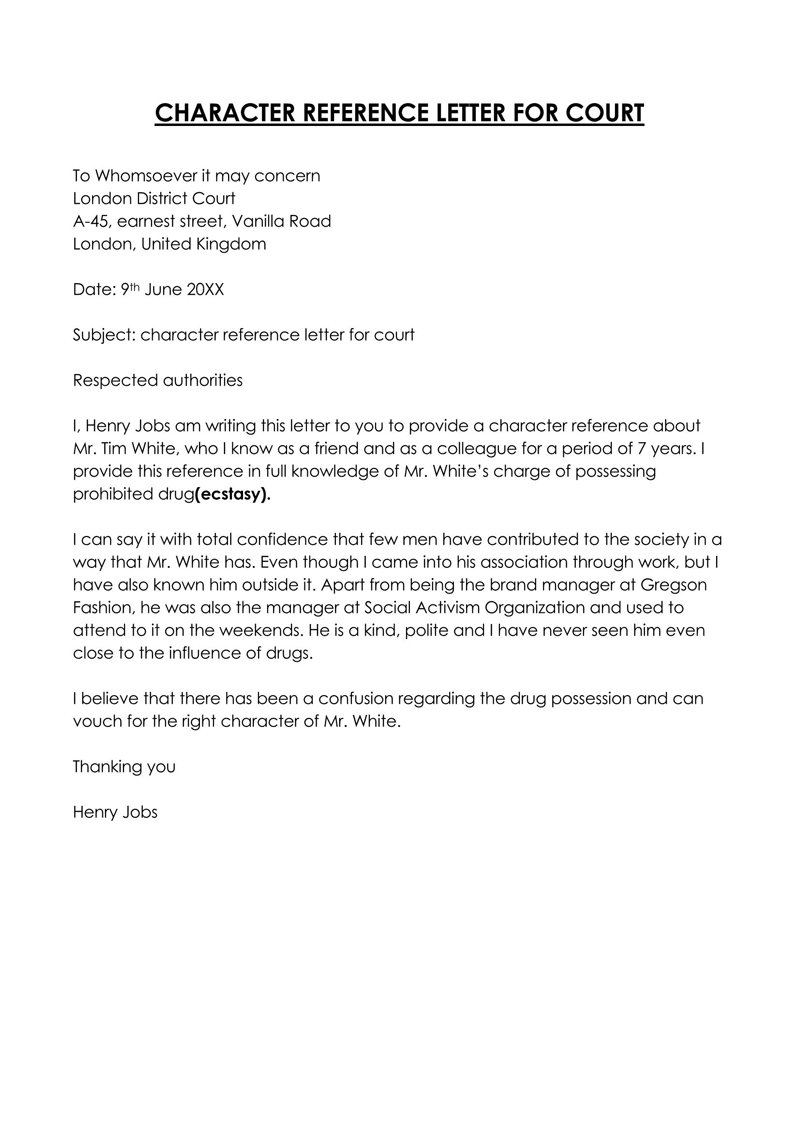
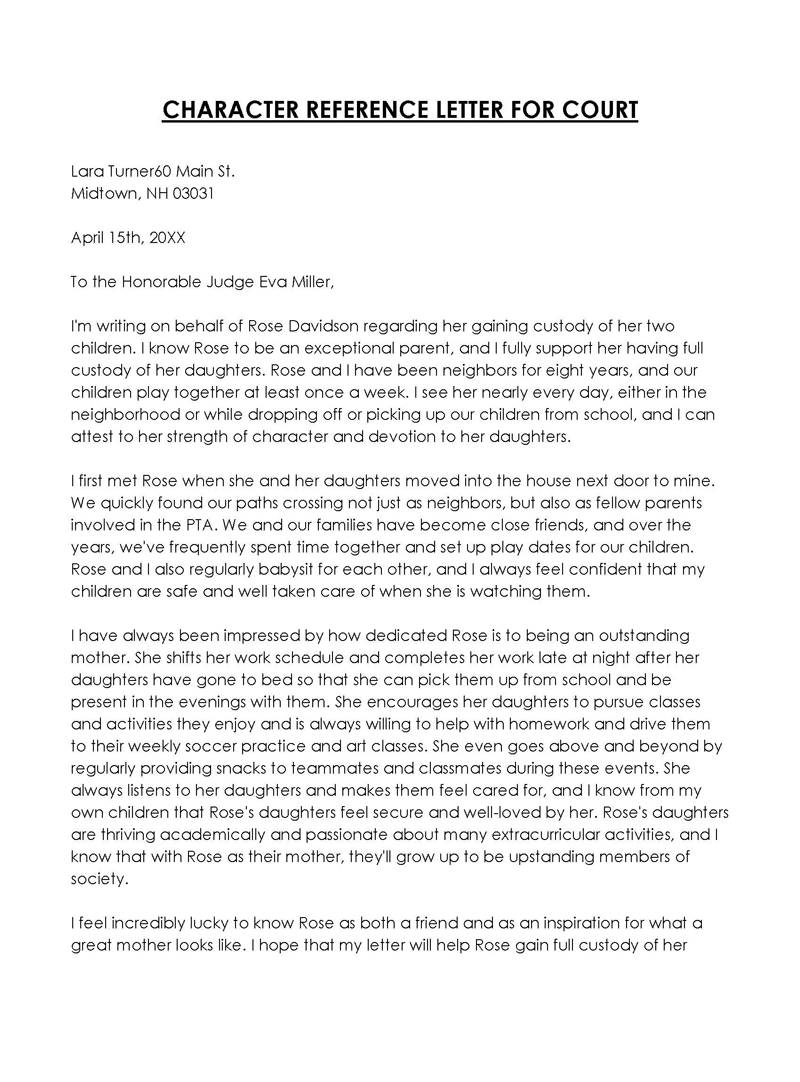
How to Write
Understanding how to write a letter can help a referee provide adequate, relevant, and impactful information about the accused. It can also help ensure that the statements made by the referee are coherent.
The following is a step-by-step guide on how to write an effective letter:
Heading and greeting
The referee should start by identifying himself/herself on the letter. This should be done on the top left corner of the page by indicating his/her name, residential address, and contact information. The date when the letter was written should be stated just below the referee details. The month, day, and year should be fully and appropriately written.
This section should also contain the following:
Case number
The heading should also reference or contain a subject line indicating the case number or the accused’s name. This helps the court attach the letter to the case or easily identify who the referee is attesting to. The type of case may also be stated in the subject line. This helps the court identify what type of case the referee is writing the letter for. However, the referee mustn’t write the information on the subject line without consulting the defendant’s attorney on what information he/she would like indicated.
Greeting
The referee must also write a formal greeting addressing the judge/magistrate presiding over the case phase. Suppose the case is in the sentencing phase and is being heard in a magistrate’s court. In that case, the referee should address ‘To the sentencing magistrate,’ or if it is being heard in the district court, the referee can address the letter ‘To the presiding judge’ if the case is at this phase. Directly addressing the judge/magistrate ensures that the court knows that the letter is written specifically for the prosecution or sentencing phase of the case. The rest of the letter should refer to the judge or magistrate as ‘You honor’ to show respect to the court.
Introduction
Next, the referee should write and explain basic information about him/her and the defendant. The purpose of the information provided in the introduction is to get the court/judge acquainted with the referee and the relationship he/she shares with the accused/defendant. The referee should ensure that the information is clear and positive. The introduction should also be short, as the bulk of the information will be provided in the rest of the letter.
The following details should be included in the letter introduction:
State who you are
The referee should start the introduction by stating and explaining who he/she is. Then, he/she should indicate his/her occupation and qualifications to show the court or/the judge that he/she is a contributing member of society. This will add credibility to the rest of the statements made in the letter.
Include details of your relationship with the candidate
The referee should also provide details about the relationship he/she shares with the defendant. He/she should indicate statements on the type of relationship they share and how long they have been associated. This will show the court that the statements made in the rest of the letter are based on the defendant’s history with the accused and his/her observations. The referee can also make a short statement indicating his/her beliefs about the defendant.
Body
The referee should then write the body of the letter. The information contained in this section of the letter is the letter’s focus. Its length will be determined by the referee’s information and the defendant’s attorney’s recommendations for what should be included. The referee should use the body to explain who the defendant is, the values he/she adds to society or the effect the accused has had on his/her life, how he/she feels about the accused, and what his/her beliefs are about the defendant.
The information should be included and broken down into the following components:
Relevant background
The referee should provide relevant background about the case. Providing background information helps humanize the defendant by showing that there is more to him/her than the crime he/she is accused of committing. This can especially be useful in child custody cases where the referee provides background information detailing the relationship shared between the child and the parent/guardian.
Personal qualities
The referee should then mention good personal qualities and character traits related to the case. The qualities mentioned should be positive and relevant to the offense committed.
EXAMPLE
If the defendant is accused of drinking and driving, the referee can state that the accused is a responsible person.
Familiarity with the court case
When drafting the letter, the referee should be sure to take note and demonstrate his/her familiarity with the charges against the defendant. Simply stating the charges and the facts of the case will be enough to show the court that the referee is fully aware of the case and why he/she is required to write the letter. The referee may also mention if there have been any discussions on the offense with the accused and what the defendant has expressed about it, for example, remorse, a desire to change, and a willingness to seek help.
Similar offense
The referee should also mention any similar offenses committed by the accused to show the court that he /she is aware of the offenses committed by the accused. Information on what is causing the accused to keep committing the offense and the actions he/she is taking to prevent or mitigate the risk of recommitting the offense should be provided. It helps show that the referee is aware of the defendant’s criminal history and what actions the accused is taking to better his/her behavior.
Your opinion
The referee should state his /her opinion on whether he/she thinks it’s out of character for the accused to commit an offense. This helps the court discern if committing offenses is part of the accused person’s nature. The opinion provided should be based on the reputation and general character traits indicated in the letter
Refer to concrete examples
The referee should provide significant examples to support the good qualities or traits indicated in the letter. This will make the letter more detailed and enable the referee to personalize the letter, making it more compelling.
Impact of the persecution
The referee should provide context on the possible impact of an unfavorable verdict for the accused or his/her family; for example, the referee may state how a defendant may be affected if custody of his/her child is taken away by the court. This will help show the court that the case’s outcome has a far-reaching impact on the defendant’s life.
Changes after the incident
The referees should indicate the defendant’s commitment to change after the case is concluded. This will show the court that the defendant is committed to reform and to becoming a better person.
Don’t suggest a penalty
The judge/magistrate is responsible for stating the penalty imposed on the defendant; therefore, the referee should avoid making such suggestions. The referee should only focus on providing information that may compel the court to rule in the defendant’s favor.
Other matters
If there are any other matters relevant to the case or that may help compel the court to rule in favor of the defendant or exercise leniency during sentencing, the referee should mention it.
Closing
The final paragraph should summarize the contents of the introduction and the body in the conclusion. The reference should also request the court to consider the letter and what effect he/she hopes the letter will have.
Signature
The referee must sign the ends of the letter by using an appropriate word or phrase, such as’sincerely,’ sign and indicate his/her name. This ensures that the letter adheres to the appropriate business format.
Character Reference Letter for Court Template
[Your Name]
[Your Address]
[City, State, Zip Code]
[Email Address]
[Phone Number]
[Date]
The Honorable [Judge’s Full Name]
[Judge’s Title]
[Court Name]
[Address of the Court]
[City, State, Zip Code]
Re: [Case Name/Number], [Name of the Person]
Honorable Judge [Last Name],
I write to you in support of [Name of the Person], who stands before your court concerning [Brief Description of the Case, e.g., “a charge of drunk driving,” “a child custody dispute,” etc. and case number]. My relationship with [Name of the Person] spans [Length of Time], during which I have known them in my capacity as [Your Relationship to the Person, e.g., “their employer,” “a family friend,” etc.]. It is with this understanding of [Name of the Person]’s character that I wish to convey my perspective on their situation.
[Name of the Person] has consistently demonstrated qualities such as [List Positive Qualities, e.g., “integrity,” “compassion,” “dedication to family,” etc.], which I have witnessed firsthand through [Describe Specific Instances or Contributions that Illustrate These Qualities].
[If applicable, include any steps the individual has taken towards rehabilitation or self-improvement, such as participating in counseling, completing community service, or other remedial actions that showcase a commitment to change and responsibility.]
I am fully aware of the gravity of [Name of the Person]’s actions that led to their current legal challenges. However, I firmly believe in [his/her/their] genuine remorse and determination to amend the consequences of [his/her/their] actions. [His/Her/Their] positive attributes and contributions to the community, alongside the efforts [he/she/they] has made towards personal growth, deserve consideration in your deliberations.
I am convinced that [Name of the Person] understands the seriousness of [his/her/their] actions and is earnest in [his/her/their] intention to move forward in a positive and responsible manner. It is with respect for your judgment and the legal process that I kindly request you to consider [Name of the Person]’s potential for rehabilitation and the positive strides [he/she/they] has already taken.
Thank you for your attention to this letter. I am willing to provide further information or discuss [Name of the Person]’s character and the circumstances in more detail should you find it necessary.
Sincerely,
[Your Signature (if sending a hard copy)]
[Your Printed Name]
Sample Character Reference Letter for Court
Following are some sample character reference letters for court:
Sample 1
Re: Case No. 7894561, State vs. Michael R. Smith
Honorable Judge Wright,
I write to you concerning Michael R. Smith, who is before you on charges related to a drunk driving incident. As Michael’s employer for the past five years at Hometown Construction, I have come to know him well and wish to share my insights into his character and the remorse he has expressed since the incident.
Michael has been an exemplary employee, known for his dedication, hard work, and integrity. He has consistently demonstrated a high level of responsibility in his role, often going above and beyond his duties to ensure safety and efficiency on our construction sites.
Following the incident, Michael immediately took responsibility for his actions. He has since enrolled in an alcohol education program and actively participates in community service, dedicating his weekends to speaking with young adults about the dangers of drunk driving. His actions show a deep sense of remorse and a strong commitment to making amends.
While I do not condone his actions, I firmly believe that Michael is not defined by this mistake. He has taken significant steps towards personal growth and rehabilitation, demonstrating his dedication to leading a more responsible life.
I respectfully request your consideration of Michael’s sincere remorse, his efforts to rectify his mistake, and his potential for a positive contribution to our community. I believe that with the right guidance and support, he will continue to make meaningful changes in his life.
Thank you for considering my letter. I am available to provide any further information you may require.
Respectfully,
[Signature]
John A. Doe
Manager, Hometown Construction
Sample 2
Re: Custody Case No. 1234567, Roe vs. Doe
Dear Judge Kim,
I am writing on behalf of my close friend and neighbor, Sarah J. Doe, about her ongoing child custody case. Having known Sarah for over ten years and observed her parenting firsthand, I feel compelled to share my observations and experiences regarding her character and dedication as a mother.
Sarah is an exceptional parent who shares a deep and loving bond with her children, Alex and Emma. She consistently provides a nurturing and stable environment for them, prioritizing their well-being, education, and emotional development. Sarah is actively involved in all aspects of their lives, from assisting with homework and attending school events to encouraging their interests and ensuring they have a healthy balance of activities.
Beyond her role as a mother, Sarah is a respected member of our community, often volunteering at the local library and participating in community clean-up events. Her commitment to making a positive impact is evident, and she instills these values in her children by involving them in these activities.
In the time I have known Sarah, I have witnessed her handle the challenges of parenting with grace and resilience. She has worked diligently to maintain a sense of normalcy and stability for her children during this difficult period. Her actions are always in the best interest of Alex and Emma, and she deeply values the importance of fostering their relationship with their father.
Given Sarah’s unwavering dedication to her children and her capabilities as a parent, I wholeheartedly support her in her pursuit of custody. I am confident that she offers a loving, supportive, and stable environment that is in the best interest of Alex and Emma.
Thank you for considering my perspective on this matter. Should you require any further information or wish to discuss this further, please do not hesitate to contact me.
Sincerely,
[Signature]
Jane L. Jefferson
Analysis
The effectiveness of these character reference letters lies in their detailed and personal testimonies regarding the individuals’ characters and behaviors. The first letter provides a nuanced portrayal of an employee’s response to a legal issue, emphasizing his exemplary work ethic, immediate accountability, and active steps towards rehabilitation, including participation in educational programs and community service. This description not only acknowledges the mistake but also highlights the individual’s sincere efforts to make amends, painting a picture of personal growth and responsibility.
The second letter offers insight into a parent’s dedication and involvement in her children’s lives, showcasing her as a nurturing, stable, and positive influence. By detailing her active participation in the children’s educational and emotional development, as well as her contributions to the community, the letter argues her capability and commitment as a parent in a custody case.
Both letters are compelling because they go beyond mere positive character assessments; they include specific examples of actions and changes that demonstrate the subjects’ good characters and efforts to improve or maintain stability in challenging situations. Their respectful tone and the authors’ readiness to provide further information lend additional credibility, making them persuasive to their respective judicial audiences.
Dos and Don’ts to Consider
There are dos and don’ts that a referee should consider when writing. This will help ease deciding on what information should be included in the letter.
The following are the dos and don’ts when writing the letter:
Do’s
- The referee should keep the information clear and precise: This will ensure that the court /judge is not exhausted by the lengthy letter. It will also ensure that only relevant information is provided.
- The referee should mention 2-3 examples: This will strengthen the statements made in the letter by helping to demonstrate the kind of person the defendant is. It also helps highlight the defendant’s good traits.
- The referee should consult the defendant’s lawyer: This ensures that the referee includes vital information that may impact the way the defendant is viewed.
Don’ts
- The referee should not be too technical with the information provided: The letter should not cite specific laws, as this is the lawyer’s job. Instead, the letter should tell a unique and personal story.
- The referee should not make suggestions on the penalty that should be imposed: They should not suggest a particular sentence or outcome, as this can be seen as leading to the court’s decision.
- The referee should not comment on whether the defendant is guilty or innocent: If the defendant has not pleaded guilty to the offense or the court has not made a verdict, the referee should avoid stating a plea in the letter. This will ensure that the referee is not deemed to have led the court to a conviction or dismissal.
Tips on Writing a Character Reference Letter for Court
There are certain tips that the referee should consider when writing the letter to the court. Considering these tips will ensure that the information is appropriately conveyed. It will also help ease the writing process.
These tips include:
Type the letter
Typing the letter will ensure the information can be easily read in the hearing. A readable letter ensures that the referee’s statements about the defendant are conveyed. It also helps ensure that the letter, which is an official document, adheres to proper business formatting rules
Be truthful
The referee’s statements must be truthful to avoid misleading the court. A court can charge a referee with perjury if he/she is found to be providing false statements. Being truthful also helps in the creation of a sincere letter.
Get the references to the lawyer early
The letter should be presented to the defendant’s lawyer early for assessment. This helps ensure that the lawyer can advise the referee on whether certain statements can be made in court and what information provided may damage the defendant’s case.
Stay positive
The information provided in the letter to the court should not make excuses for the offense committed by the accused. This can be offensive to the victim; instead, the referee should keep the letter positive and focused on attesting to the kind of person the accused is.
- When drafting a letter for a friend, always state and explain the relationship shared with the individual and the duration.
- The letter for a friend should also contain positive traits and attributes about the subject, acknowledgment of the offense, and measures taken by the subject to prevent or mitigate a repeat of the mistake.
Frequently Asked Questions
This letter should be written by someone close to the person who needs it for court. These may include friends, family members, employers, charity organizations, religious organizations, and work colleagues.
The referee to be tasked with writing the letter needs to select wisely and with much care to ensure that they will be able to write about specific relevant points about the accused.
The referee needs to consult with the defendant’s lawyer before writing the letter. As much as the letter should be official, it should also cover the relevant points. The defendant’s lawyer can be able to provide the referee with material points about the case, so they don’t end up claiming that the defendant didn’t commit the crime when they have already pleaded guilty to the offense.
Generally, there is no specific limit to how many character reference letters you can use in court. It is recommended to use the best 2-4 character reference letters in court, contingent on the case, offense, and the offender’s circumstances.
Depending on where the case is being heard, the referee is not generally required to attend court. However, if the case is being heard in the District Supreme Court, then the referee may be required to attend court to provide any evidence should the prosecution wish to ask questions regarding the contents of the letter. The referee may not be required to participate in such a case hearing if a copy of the letter is forwarded to the prosecutor in advance.
Even though a character reference letter for court is addressed to the judge or magistrate, it should not be sent directly to the court. Instead, it should be handed to the accused or their lawyer. The lawyer will check whether the letter can be helpful to the case and whether it will be beneficial for the situation at hand.
You should send a reference letter as early as possible and well before the date of the court hearing, as the lawyer will go through the letter and determine whether to use it or not. The letter may also provide the lawyer with some insight about the accused they had not previously known.












